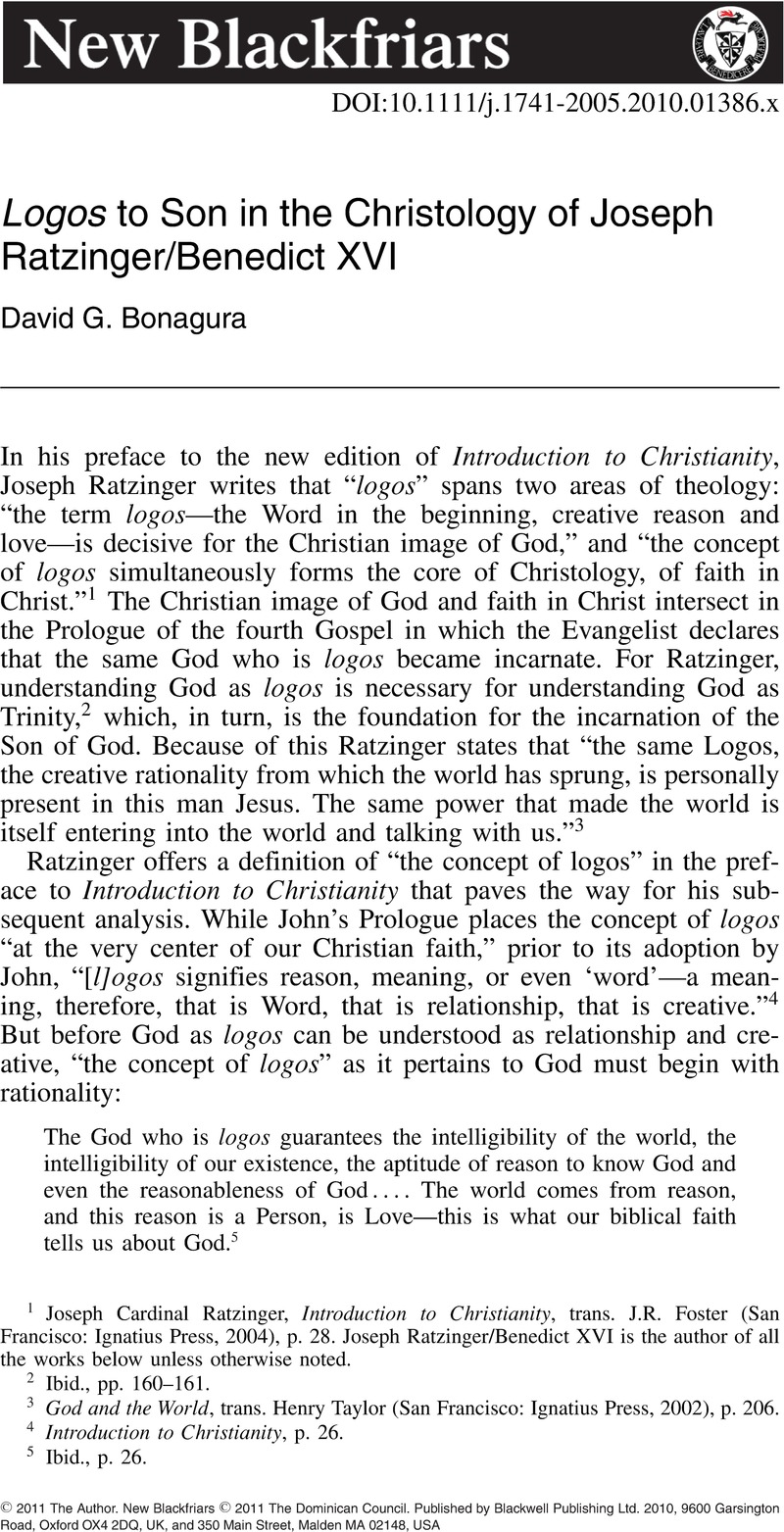Article contents
Logos to Son in the Christology of Joseph Ratzinger/Benedict XVI
Published online by Cambridge University Press: 01 January 2024
Abstract

- Type
- Original Articles
- Information
- Copyright
- Copyright © 2011 The Author. New Blackfriars
References
1 Joseph Cardinal Ratzinger, Introduction to Christianity, trans. J.R. Foster (San Francisco: Ignatius Press, 2004), p. 28. Joseph Ratzinger/Benedict XVI is the author of all the works below unless otherwise noted.
2 Ibid., pp. 160–161.
3 God and the World, trans. Taylor, Henry (San Francisco: Ignatius Press, 2002), p. 206Google Scholar.
4 Introduction to Christianity, p. 26.
5 Ibid., p. 26.
6 Ibid., p. 119. In the Regensburg Address, Benedict XVI calls the Septuagint more than a “simple translation of the Hebrew text: it is an independent textual witness and a distinct and important step in the history of Revelation.” The text is in Rowland, Tracey, Ratzinger's Faith (New York: Oxford University Press, 2008), p. 169Google Scholar.
7 Ibid., p. 119.
8 Ibid., p. 123.
9 Ibid., p. 123.
10 Ibid., pp. 124–125.
11 Ibid., p. 130.
12 Ibid., p. 130. Emphasis in original.
13 Ibid., pp. 135–136.
14 Ibid., p. 136.
15 Ibid., p. 137. Ratzinger adds that this choice “has to be made afresh in every spiritual situation.”
16 Ibid., pp. 137–138. Emphasis in original.
17 Ibid., p. 138.
18 Ibid., p. 141. Ratzinger cites Tertullian, in “one of the really great assertions of patristic theology,” as the exemplar of this choice: “Christ called himself truth, not custom.” See De virginibus velandis I, I, in Corpus Christianorum seu nova Patrum collectio (CChr) 2:1209.
19 Ibid., p. 143.
20 Ibid., p. 144.
21 Ibid., pp. 147–148. Emphasis in original.
22 Ibid., p. 146.
23 Ibid., p. 148. Emphasis in original.
24 Ibid., p. 147.
25 Ibid., p. 148. Emphasis added.
26 Cf. “[T]he truly divine God is the God who has revealed himself as logos and, as logos, has acted and continues to act lovingly on our behalf.” In Rowland, p. 170.
27 Introduction to Christianity, p. 148.
28 Ibid., pp. 151–152.
29 The Nature and Mission of Theology, trans. Walker, Adrian (San Francisco: Ignatius Press, 1995), p. 25Google Scholar. Cf. Introduction to Christianity, pp. 156–158.
30 Ibid., p. 24.
31 Ibid., pp. 24–25. Cf. God Is Near Us, eds. Horn, Stephan Otto and Pfnür, Vinzenz, trans. Taylor, Henry (San Francisco: Ignatius Press, 2003), pp. 20–21Google Scholar.
32 Introduction to Christianity, p. 158. Here Ratzinger begins to recast his aforementioned understanding of the philosophers’ God as personal in order to show that the same can be said of the logos. The reformulation is vital to Logos Christology.
33 Ibid., p. 158.
34 Ibid., p. 146.
35 Ibid., p. 158. Cf. note 22, above.
36 Ibid., pp. 158–160.
37 Ibid., p. 160.
38 Ibid., p. 160. Ratzinger defines “person” while discussing the Trinity. See Ibid., pp. 181–184.
39 Ibid., p. 161.
40 Ibid., p. 182.
41 Ibid., p. 183.
42 Ibid., p. 183.
43 Ibid., p. 185.
44 Ibid., pp. 183–185. Cf. Jesus of Nazareth, p. 343.
45 Ibid., p. 185.
46 Ibid., p. 186.
47 Ibid., p. 186.
48 Ibid., p. 188. Cf. Jesus of Nazareth, pp. 265–266; 348–349.
49 Ibid., p. 189.
50 Ibid., p. 189. Emphasis added.
51 Truth and Tolerance, trans. Taylor, Henry (San Francisco: Ignatius Press, 2004) pp. 172–173Google Scholar. Cf. Introduction to Christianity, p. 225.
52 Introduction to Christianity, p. 193.
53 Ibid., p. 194.
54 God and the World, p. 206. See note 3, above.
55 God Is Near Us, eds. Horn, Stephan Otto and Pfnür, Vinzenz, trans. Taylor, Henry (San Francisco: Ignatius Press, 2003), p. 14Google Scholar. Cf. Jesus of Nazareth, p. 334.
56 Ibid., p. 14.
57 Jesus of Nazareth, p. 334.
58 Ibid., p. 334.
59 Cf. Rom 5:19.
60 God Is Near Us, p. 24. “Pitched his tent” is Ratzinger's preferred translation of “eskenōsen” in John 1:14; see Ibid., p. 22.
61 Jesus of Nazareth, p. 266.
62 Introduction to Christianity, pp. 205–207; 225–228.
63 Ibid., p. 206.
64 Ibid., p. 206.
65 Ibid., p. 206.
66 Ibid., p. 226.
67 Deus Caritas Est, no. 12.
68 Jesus of Nazareth, p. 334.
69 The Spirit of the Liturgy, trans. Saward, John (San Francisco: Ignatius Press, 2000), p. 47Google Scholar.
70 Introduction to Christianity, p. 226. Emphasis in original.
71 Truth and Tolerance, p. 182. This passage is quoted by Rowland, Ratzinger's Faith, p. 64. In the accompanying footnote she adds, “For the same idea expressed in different words see Deus Caritas Est, art. 10.” Cf. Introduction to Christianity, p. 208. See also note 19, above.
72 Jesus of Nazareth, pp. 263–272.
73 Jesus of Nazareth, p. 269.
74 Ibid., pp. 268–269. Cf. Deus Caritas Est, no. 13; God Is Near Us, p. 21.
75 God Is Near Us, p. 21.
76 Ibid., p. 21.
77 Ibid., p. 21.
78 Jesus of Nazareth, p. 269.
79 Ibid., p. 270.
80 Ibid., p. 270.
81 Deus Caritas Est, no. 13.
82 The Feast of Faith, trans. Harrison, Graham (San Francisco: Ignatius Press, 1986), p. 65Google Scholar.
83 Ibid., p. 94. Emphasis in original.
84 Sacramentum Caritatis, no. 70.
85 Pilgrim Fellowship of Faith: The Church as Communion, eds. Horn, Stephan Otto and Pfnür, Vinzenz, trans. Taylor, Henry (San Francisco: Ignatius Press, 2005), p. 115Google Scholar.
86 The Spirit of the Liturgy, p. 45.
87 Pilgrim Fellowship of Faith, pp. 115–117; The Spirit of the Liturgy, pp. 44–50.
88 The Spirit of the Liturgy, p. 47.
89 Ibid., p. 47.
90 Ibid., p. 50.
91 Ibid., p. 49. Emphasis added.
92 Deus Caritas Est, no. 14.
93 Pilgrim Fellowship of Faith, p. 117.
94 Deus Caritas Est, no. 14. Emphasis added.
95 See, for example, Introduction to Christianity, p. 73; and the Subiaco Address, in Rowland, Ratzinger's Faith, p. 164. The citation is in the latter.
96 “Regensburg Address,” in Rowland, p. 170. See note 28, above.
97 Jesus of Nazareth, p. 349.
- 2
- Cited by




